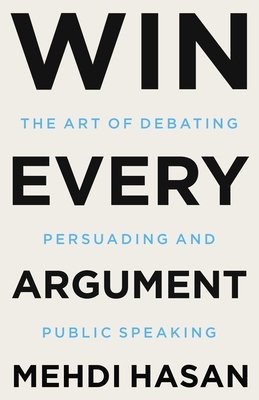
11 May Book Review of Win Every Argument: The Art of Debating, Persuading, an…
Win Every Argument: The Art of Debating, Persuading, and Winning People Over by Mehdi Hasan: A Personal Reflection
From the moment I picked up Win Every Argument by Mehdi Hasan, I felt an undeniable spark of excitement. As someone who often finds themselves in spirited discussions, the prospect of honing my argumentative skills was tantalizing. Hasan, a seasoned TV pundit and master of rhetoric, invites readers into the world of debate not just as an intellectual exercise but as a vital aspect of democracy itself. His assertion that arguments expose us to new ideas and bring us closer to the truth resonated deeply with me—a reminder that healthy discourse is a powerful tool for growth.
In his book, Hasan explores the ancient art of rhetoric, weaving in the ideas of renowned philosophers like Aristotle and John Stuart Mill. The triumph of rhetoric is not merely about winning debates; it’s about engaging with the fabric of our societal beliefs. Hasan underscores that effective arguments are built on a triad of ethos, pathos, and logos—each crucial to swaying listeners and establishing credibility. His insights reveal a well-rounded understanding of how emotion and judgment intertwine, making the act of persuasion both an intellectual and emotional endeavor.
One of the highlights of Win Every Argument is Hasan’s practical guidance on storytelling. It made me reflect on my own experiences; often, the most memorable arguments I’ve encountered were rooted in personal narratives rather than abstract data. At one point, Hasan cites a study that reveals the profound impact of storytelling on charitable giving—a stark reminder that connecting emotionally can catalyze change. His advice was a breath of fresh air: if we want to persuade, we must be willing to narrate compelling stories that resonate on a human level.
Hasan’s writing style is refreshingly conversational, akin to having a spirited chat over coffee. The pacing is brisk, interspersed with memorable anecdotes and snippets from his own debates with influential figures on the world stage. The book not only informs but entertains; I found myself chuckling at his brazen critiques of public figures while nodding in agreement as he dissected the flaws in popular arguments.
One particularly striking moment came when Hasan addressed the merits of ad hominem arguments. Contrary to the long-held belief that such tactics are inherently fallacious, he offers a nuanced perspective—sometimes, going after the character of an opponent can be a strategic necessity. This concept sparked a lot of internal dialogue for me, reflecting on how perception often drives opinion in a polarized world. It was these insights that made the material feel relevant and immediate.
Win Every Argument is not just for debaters or political aficionados; this book is a treasure trove for anyone looking to refine their communication skills, gain confidence in their opinions, and engage more deeply in conversations. Whether you’re a student navigating classroom debates, a professional aiming to articulate ideas persuasively, or simply someone eager to make their voice heard, Hasan’s guidance will prove invaluable.
In conclusion, Mehdi Hasan has crafted an engaging and insightful guide that invites readers to rethink the art of argumentation. Through practical tips and compelling examples, he reminds us that the stakes of persuasive discourse are high—not just for winning debates, but for the health of our democratic society. This reading experience left me feeling invigorated, arming me with tools to approach discussions both strategically and empathetically. I wholeheartedly recommend Win Every Argument to anyone eager to elevate their debate skills while appreciating the rich tapestry of human communication.
Discover more about Win Every Argument: The Art of Debating, Persuading, an… on GoodReads >>









